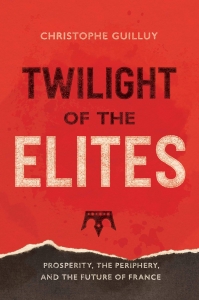Book Review | Twilight of the Elites: Prosperity, The Periphery and the Future of France by Christophe Guilluy
In Twilight of the Elites: Prosperity, The Periphery and the Future of France, Christophe Guilluy sets out the predicament of the ‘left-behind’ regions of France and excoriates the elites that have presided over their decline. While Guilluy does make a novel set of claims about the working-class response to recent political developments, peripheral France requires a more granular analysis than that found in this book, writes John Tomaney, which offers polemic over convincing scholarship.

Picture lthmus/(CC BY 2.0) licence
Twilight of the Elites: Prosperity, The Periphery and the Future of France. Christophe Guilluy (trans. by Malcolm Debevoise). Yale University Press. 2019.

In Twilight of the Elites: Prosperity, The Periphery and the Future of France, Christophe Guilluy sets out the predicament of the ‘left-behind’ regions of France and excoriates the elites that have presided over their decline. The book is already a cultural phenomenon. It was first published in France in 2016 (as Le crépuscule de la France d’en haut, Editions Flammarion), attracting extraordinary media attention there. Restating his thesis about the emergence of ‘peripheral France’ beyond the big cities, which contains 60 per cent of the national population (set out earlier in his La France périphérique: Comment on a sacrifié les classes populaires, Editions Flammarion, 2014), in Twilight of the Elites, Guilluy predicts a political backlash against rising inequality in the form of a ‘modern slave rebellion’ (3). When the gilets jaunes took to the streets in 2018, initially to protest again fuel tax rises, Guilluy assumed the mantle of prophet and oracle of peripheral France.
According to Guilluy, the determining fracture in French society is between big cities and the rest of France. Residents of the big cities – the ‘new citadels’ – have captured the spoils of globalisation while medium-sized and smaller towns and rural areas experience spiralling decline. His main target is the unholy alliance between the traditional bourgeoisie and the new ‘bohemian-bourgeois’ – or ‘bobos’– who work in industries such as media, tech and higher education. Bobos parade their progressive cosmopolitan values and advocate openness, while all the time playing the real estate market, sending their children to private schools and ignoring their own ‘multiculturist blather’ (41), exploiting low-wage immigrant labour. This results in the systematic exclusion of the working class from a share of growth.
The growing economic domination of the big cities – ‘metropolisation’ – is the ‘domestic corollary’ (58) of globalisation, producing social and geographical polarisation, according to Guilluy. In this scenario, the middle class shrinks, and the white working class is relegated to the places outside the big cities. The education system, in particular the leading universities located in Paris, plays a key role in reproducing the privileged position of the bobos and, in effect, discriminates actively against the white working class. Social and ethnic endogamy reinforces social and geographical cleavages. The republican model of secularism and egalitarianism is superseded by sectarian intolerance, widespread civic mistrust and ‘multicultural grievances and competitive victimhood’ (69).
The book laments the disdain which the French elite holds for those left out of economic growth. Public opinion is managed to present metropolisation as providing benefits to the whole of society rather than narrow corporate interests. Guilluy presents an exegesis on how official statistics mischaracterise geographical divisions, seeking to obscure – ‘wilfully or otherwise’ (85) – how poverty is concentrated in peripheral France. The elite prefers to restrict discussion of social problems to the condition of the multi-ethnic banlieues, partly to display their cultural sensitivity. The bobos dismiss the objections and claims of peripheral France as racism and pathologise working-class people for their lack of skills and their immobility.
Using quasi-Marxist language, Guilluy suggests the new bobo class has developed a new ideology to justify its class position. Drawing on neoliberal economics and postmodern cultural claims, it promotes the ‘myth of the open society’ (5). But the open society delivers the accumulation of wealth in few hands, while fomenting the widespread decline of small towns and villages. Recent French Presidents Nicholas Sarkozy, François Hollande and Emmanuel Macron have offered only slight variations on this ideology. Convinced of their own progressive values the bobos typically vote for left-wing politicians in the mould of city mayors around the world, including Mayor of Paris Anne Hidalgo, Mayor of London Sadiq Khan and Mayor of New York City Bill de Blasio, who extol openness, networks, multiculturalism and mobility but accommodate international capital. The working class is rendered ‘invisible and inaudible’ (141) and is disaffiliating from conventional politics. Voting abstention is a more important trend than the rise of Marine Le Pen’s Front National/Rassemblement National.
Much of the analysis is familiar and find echoes in (subtler) analyses of, say, left-behind places in Australia or the decoupling of London from the English regions. The book does make a novel set of claims about the working-class response to these developments. Retreating to their banlieues and villages as a result of ‘enforced localism’ (102), the working class practises a new ‘sovereignism’ – a kind of taking back control from below. This involves protecting the social networks on which communities depend, ‘because rootedness in a local community is a valuable resource for poor households’ (117). Working-class opposition to immigration, Guilluy claims, is a rational response by self-reliant low-income groups seeking to protect social and cultural capital threatened by globalisation. Rejecting the ‘fantasy of unlimited and universal mobility’ (130), he identifies the ‘return of sedentism’ (131), which could be described as a new tendency to ‘stay put’. Upon sedentism, he implies, working-class towns and villages can be sustainably rebuilt. Unfortunately, this interesting discussion is unburdened by any supporting evidence.
Guilluy offers polemic rather than convincing scholarship. The argument is both powerful and flawed, resting unsteadily on simple binaries, sweeping generalisations, paucity of evidence, contradictory claims and a moral haughtiness. At times, Guilluy even implies a systematic conspiracy on the part of the bobos to marginalise the working class. Terms such as ‘globalisation’ are used freely but never rigorously defined. There is no discussion of the international macroeconomic and geopolitical forces that are reshaping French society. The contemporary moment is implicitly contrasted with an earlier republican, egalitarian France, but the strengths and weaknesses of this model – and the extent of its demise – are not investigated. Peripheral France – which contains, according to Guilluy, the majority of the population – surely requires a more granular analysis than that offered here. In his attempt to defend small towns from the condescension of the bobos, there is also a tendency to downplay the role of racism in French politics. Guilluy offers only a thin and unconvincing policy agenda, amounting to little more than an aversion to top-down solutions and the need to focus on real community needs. (Debates about the Foundational Economy and The Everyday Economy could provide insights here.) Reading the book will be a masochist experience for members of the educated, solipsistic, cosmopolitan left who work in the media or universities of global cities, but it offers at best a partial account, and no routes out, of the present crisis.
This review gives the views of the author, and not the position of Democratic Audit. It was first published on the LSE Review of Books blog.
John Tomaney is Professor of Urban and Regional Planning in the Bartlett School of Planning, University College London.





 Democratic Audit's core funding is provided by the Joseph Rowntree Charitable Trust. Additional funding is provided by the London School of Economics.
Democratic Audit's core funding is provided by the Joseph Rowntree Charitable Trust. Additional funding is provided by the London School of Economics.